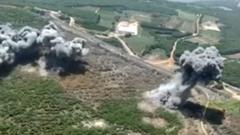The head of Revayat-e Fath Foundation, an IRGC-affiliated cultural center, said the foundation is going to produce cinematic works on Iran’s offensive against Israel.
Hailing Iran’s missile and drone attacks, Ali Moqavasaz stressed that Revayat-e Fath Foundation intends to memorialize the “historic day” through backing artworks glorifying the event and also organizing a festival.
So far, no filmmakers have announced their readiness to produce works in this regard but we aim to take a serious action and make films about Israel, Palestine and the Islamic Republic’s missile and drone attacks against Israel, he went on to say.
Iran launched a barrage towards Israel on Saturday night of over 350 drones and missiles, most of which were intercepted by Israel and its allies before reaching Israeli territory.
The attack, Iran claims, was retaliation for the alleged Israeli airstrike on the Iranian consulate in Damascus this month, in which a senior Quds Force commander was killed along with other IRGC personnel.
Moqavasaz also pledged that Revayat-e Fath is going to produce cinematic productions about IRGC commanders. However, he did not elaborate on the identities of the financiers of these projects.
The Iranian government does not clearly announce the amount of funds allocated to many state-sponsored organizations and institutions, and the details of their expenditures are not reported at the end of the year.
Four years ago, Revayat-e Fath made a feature film named “Sniper” with a budget of at least 100 billion rials (around $400,000 at that time). The film, which narrated the adventures of a sniper during the Iran-Iraq war, was evaluated by critics as “low quality.”
The foundation also produced in 2011 the notorious movie “Golden Collars” directed by former intelligence officer Abolqassem Talebi. The movie garnered harsh criticisms from the public for its reproduction of the regime’s account of the Green Movement, the unprecedented protests following Iran’s controversial presidential elections in 2009.
Revayat-e Fath Foundation is named after a series of documentaries produced by renowned pro-government filmmaker and author Morteza Avini about Iran-Iraq eight-year military conflict. Iranian officials and state media frequently credit Avini for his ideas of “Islamic and revolutionary art and cinema.” Revayat-e Fath literally means “the narrative of conquest.”
Following the 2022 uprising triggered by the death in morality-police custody of Mahsa Amini, former head of Revayat-e Fath Foundation Mohammad Naderi lambasted artists who supported the nationwide protests, many of whom were threatened with travel bans, work bans and even prison.
“A number of famous figures have been openly and publicly kicking [the government] over the past months. This is our fault because some institutions and organizations were busy making celebrities and ignored the real artists”, Naderi said, further adding that the protesting artists were “useless figures and celebrities” who “betrayed the government, people and country.”
In October, the Iranian government officially released a list of actresses who are prohibited from working in the film industry due to refusal to wear the mandatory hijab. The list includes several well-known figures in the Iranian film industry, such as Baran Kosari, Vishka Asayesh, Taraneh Alidousti, Katayoun Riahi, Panteha Bahram, Hengameh Ghaziani, Pegah Ahangarani, and more.
"Due to the constraints they confront, these actresses will no longer be able to pursue their careers in cinema. Nevertheless, their previous works will be gradually released to safeguard the interests of film producers, given the substantial investments made in these projects. However, they will be barred from participating in any forthcoming film productions," said Habib Ilbeigi, the director of the Supervision Department in the state-affiliated Film Organization.
Despite spending a lot of money, the films and series produced by the Iranian government, tasked with promoting the ideological worldview of the Islamic Republic, have not been able to win the public’s approval in Iran, with some even becoming the butts of ridicule and mockery.
In January, a scene from a TV series was shared extensively by social media users in Iran as it depicted clerics being attacked by security forces several decades ago. Broadcast on Iran’s state TV, “Motherland” (“Sarzamin-e Madari” in Persian) covers the sociopolitical history of the country over a time span of 37 years, from 1942 to the birth of the Islamic Republic in 1979, according to the ruling regime's ideological prism. IRGC-affiliated Fars news agency has hailed the series as “the narrator of the ups and downs of the history of Iran in the contemporary era.”
In one scene, which is apparently aimed at promoting an oppressed picture of clerics during the reign of Pahlavi monarchs in the 20th century, security forces are shown to be shooting and killing clergymen. The scene went viral on X and Instagram as Iranian users remixed it with happy, celebratory and heroic songs in what can be interpreted as an explicit gesture of opposition to the theocratic government in the country.

 1 week ago
18
1 week ago
18


